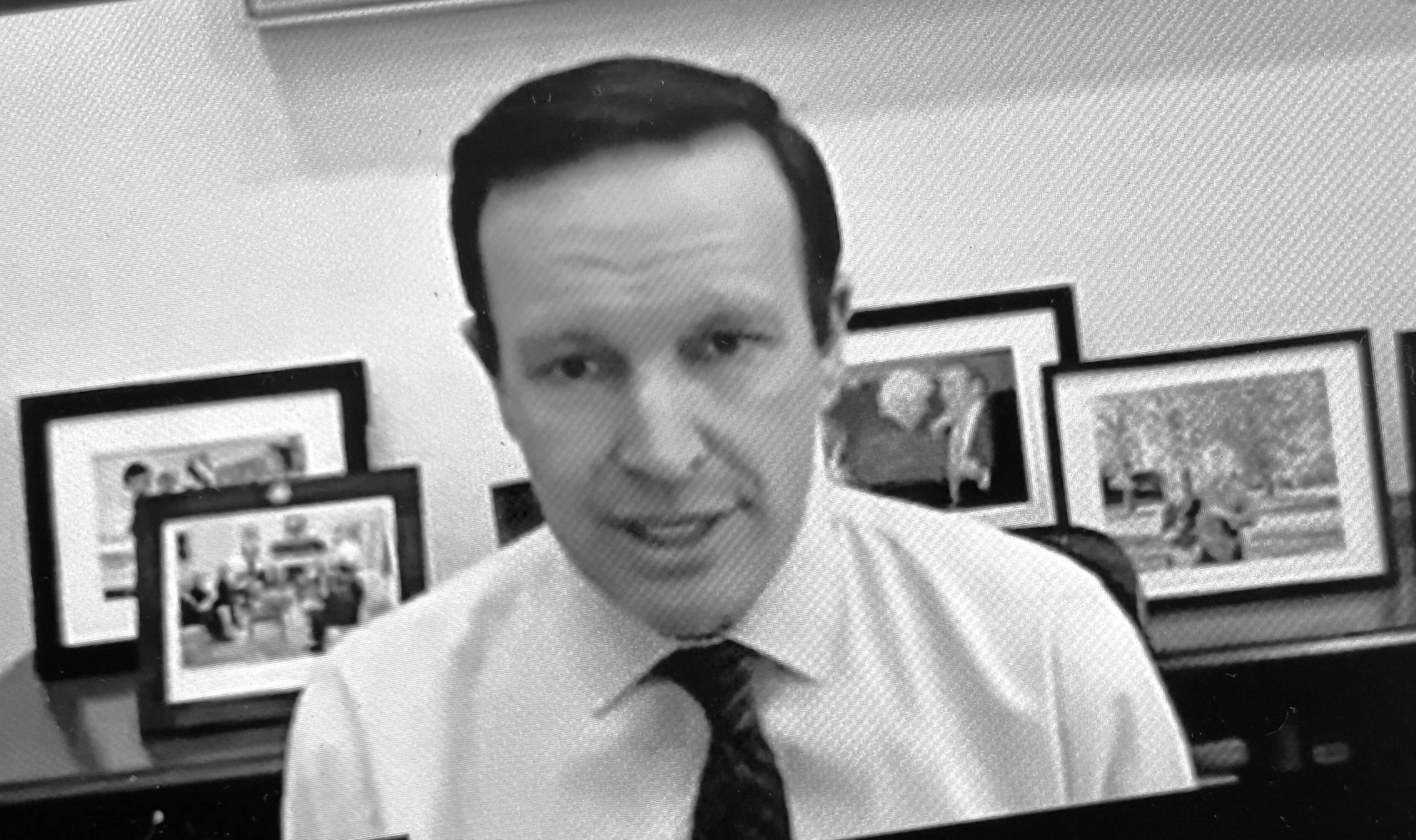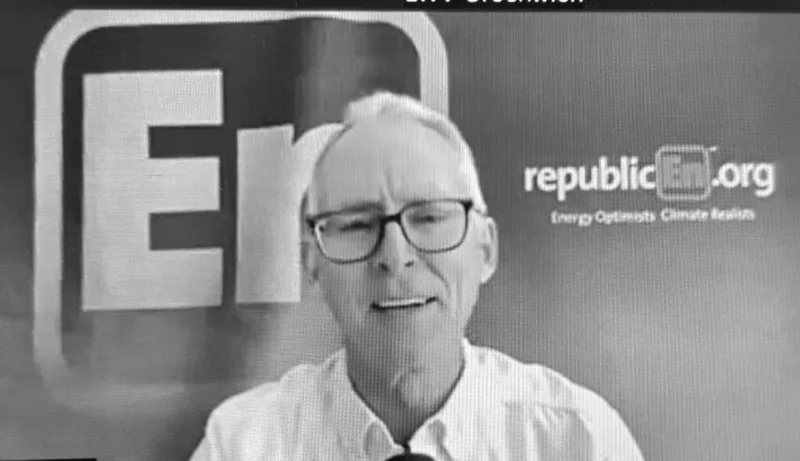
By Anne W Semmes
The Greenwich League of Women Voters (LWV) with its mandate to “empower voters” recently featured on Zoom two leaders from “across the aisle” addressing their efforts with the challenges of climate change. LMV board member Dierdre Kamlani first introduced Democratic U.S. Senator Chris Murphy, then former Republican U.S. Rep. Bob Inglis from South Carolina, now heading republicEN that promotes “free enterprise and innovation to solve climate change.” “For his work on climate change,” Kamlani shared, “Mr. Inglis was given the 2015 John F Kennedy Profile in Courage Award.”
U.S. Senator Chris Murphy
Senator Murphy began, “I have spent a good part of the last two to three years of my time in the Senate trying to find that hard earned consensus on some of the most difficult issues that Washington deals with.” He was “proud and lucky” to have “forged a bipartisan compromise on the issue of firearms control, the first meaningful gun safety bill in 30 years.” But four months of “trying to find a bipartisan compromise on the issue of immigration,” had brought no success. “Guns is hard, immigration is harder,” but, “Climate change is the hardest.
“If we don’t make significant changes in the trajectory of climate emissions from the United States, still 25 percent of the world’s pollution in the next five to 10 years, it will be too late. And that’s a really scary thing. As a parent, I have two very climate conscious kids, a 15-year-old and a 12-year-old. I hate the fact that they’re climate conscious. I hate the fact that they come home every day worrying whether there is going to be a planet around for them.”
Murphy had a hand in getting bipartisan support for an amendment to the Kigali Treaty that allows the U.S. “to participate more fully in the control of HFC’s [super pollutants],” and he’s “committed to trying to find that common ground” with Republicans. “I have enormous respect for Bob Inglis. We served together in the House. But there’s really no home for his [conservative] view in the Republican Party today. This is a party that has become more radicalized every year on the issue of climate. They’re not coming closer to a solution. They are moving further away.”
He cited “The progress we have made has unfortunately been forged only with Democratic votes. The Inflation Reduction Act represents the biggest change in US climate policy in the history of our country…the estimate is that the Inflation Reduction Act will by 2030 bring down emissions from the United States by 50-percent compared to 2005.” “You will find Republican support for energy efficiency,” he added, “which is a big part of the solution…you’ll find lots of Republican support for nuclear power.” But he concluded, “We seem to be getting further apart on climate. We’ll continue to try to find that common ground.”
Former U.S. Representative Bob Inglis
“The Senate is a place where the framers counted on people working together to work out differences between the States and to make it work,” Inglis began. “And the last four months as Senator Murphy has been in the news shows that that’s a real Senator at work. So, congratulations to you, Chris, for being that kind of Senator.” Inglis addressed his “conservative concern about climate change” when “this is a liberal cause. That’s what I thought from my first six years in Congress. Al Gore was for it, and I was against it.”
Years later he told of after having chosen to run again for Congress, he, like Murphy, had been approached by his 18-year-old son, the oldest of his five children. “He was voting for the first time and said, ‘Dad, I’ll vote for you, but you’re going to clean up your act on the environment. “
He would then support legislation calling for a carbon tax that became the American Clean Energy and Security Act of 2009. But he lost his election. His effort, he said, “was not good political timing.” But “After I got tossed out, a foundation came to me and said, ‘Inglis, with all those conservative ratings you’ve got, it’s pretty clear you’re an actual conservative who cares about climate change,” That foundation was republicEN. “EN is for energy entrepreneurship…And if you are a conservative and you care about climate change, join us.’ And that’s what I’ve done ever since.”
Three Reasons for Optimism on Climate
Inglis then addressed Murphy’s pessimism with radicalized Republicanism. “I’m going to give you three reasons for optimism on climate… Number one is the realities of climate change… mostly people have stopped arguing with the thermometer…they’re stopping to argue about sea level rise. It’s just obvious that it’s happening. So, first reason for optimism, the realities of climate change. Second is the demographics of climate change.”
“The polling data shows that conservative young people want action on climate change,” he told, “just like young progressives do. Apparently, they plan on living on the planet for a while…It’s a low propensity voter constituency. As the League of Women voters could tell us, you get older, you get to be higher propensity voters. But that constituency is coming. And so, what you have is some long-time horizon Republicans who want to lead that constituency. “
His third reason for optimism on climate: “We need to reveal the hidden cost of the burning of fossil fuels.” He explained, “There’s a policy wave that’s coming at us. Starting in October of 2023, Nucor Steel, in South Carolina has to report to the European Union its carbon emissions on the steel that it makes in South Carolina starting in 2026. They’re going to have to start paying essentially a tax, a carbon fee, a tariff, whatever you want to call it. It’s basically forking over money to the Europeans that they could have paid here.”
Inglis pointed to Murphy’s suggested solution of “internalizing negative externalities,” as the key, when Republicans and Democrats realize that “we could do this to China. The goal is to get other countries to do their own so that then you get 8 billion people seeing the true cost of burning fossil fuels because it’s in the price of everything….then we’ve got free enterprise innovation happening…So, ultimately, we hope we can help bring America together if we have senators who act like Senator Murphy – as a real senator in pulling people together.”

League of Women Voters Q&A With Senator Chris Murphy and Bob Inglis
Q: Senator Murphy, how do we address the impact of partisan media bubbles on the different ways voters understand the issue of climate change?
A: That’s the piece here that is the hardest to figure out…What worries me is that you’ve got some near monopoly companies in the social media space, and so when they make a small decision on how they tweak their algorithm on an issue like climate, it impacts us all in a very big fundamental way…. If you had fundraising reform, the fact of the matter is the fossil fuel groups outspend the climate groups 27 to one. There’s just an enormous amount of money because the industry is so profitable being pushed into politics. Much of it goes into these super pacs. So, you have no idea how much a fossil fuel company is putting in to an effort to defeat a candidate. So, if you had, at the very least, just disclosure of everybody who donates money…that would put some downward pressure on the industry, which right now is greatly outspending the forces that are trying to change things.
Q: Bob Inglis, following up on the Senator’s remarks, how can we get the current fossil fuel companies to aid in the transformation of our energy grid? Can they and the Congress help with transparency and education of the public informing us about how much pollution they and their products are expelling and what they are doing to help mitigate climate change?
A: If I were on the board of ExxonMobil, I’d be saying at every meeting… if we don’t get with it, we’re toast because Elon Musk is electrifying the fleet… we’re going to lose a massive piece for our business if we don’t figure out a way to invent the next thing. Perhaps hydrogen, maybe reforming somehow that natural gas …if we could sequester the CO2, in other words, I think it’s going to be in their interest to do something eventually.
There’s two ways to fix climate change. You can regulate emissions. You can incentivize clean energy, and I agree with Senator Murphy that we’ve done that, and it’s going to be very powerful here in America. Or third, you can do a carbon tax and apply it at the borders. So, a company like ExxonMobil actually prefers that third one. They want to keep it fairly low, and that’s where the rub comes. If you’re out to solve climate change, it works worldwide because those incentives don’t apply to companies who don’t pay American taxes. Or you can do a carbon tax and apply it at the borders. But at least they’re in that discussion. And so, it gives me some hope that we might actually move toward that.
Q: Senator Murphy, in your opinion, is there more partisan disagreement over the risks of climate change behind the scenes as you’re talking to your colleagues? Or is the real disagreement over how to deal with it?
A: I think there’s real fundamental disagreement… So, right now, the fundamental problem is that most of the Republicans we work with do not think that climate change is an acute problem that needs to be solved on the schedule that the scientists tell us we have to solve it. A lot of people have an impression that members of Congress think one thing quietly and do another thing publicly. That doesn’t tend to be how this place works. It tends to be that people do what they think…A lot of Republicans really do think that we’re safer if we have more guns. A lot of Republicans do believe that the climate crisis is not real, or at least it’s not as acute as scientists say. And that makes it a harder problem to solve because we aren’t just trying to solve the politics. We are really trying to change people’s minds.




